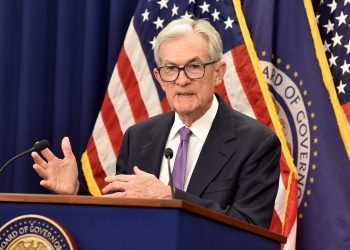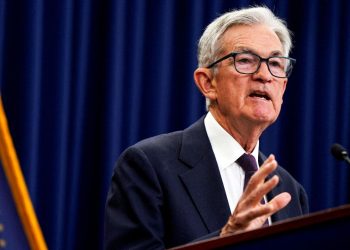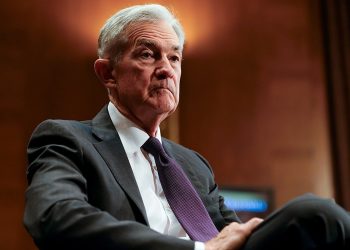In the run-up to 2023, the outlook for the global economy appeared bleak. Analysts predicted that Russia’s invasion of Ukraine and the subsequent surge in energy prices would trigger a significant economic downturn in Europe. Bloomberg Economics proclaimed that there was a 100% probability that the United States would suffer a recession. Few believed that most developing economies could withstand the combination of rising energy prices, soaring interest rates, and a downturn in developed countries.
Had forecasters anticipated the war between Israel and Hamas and its potential for regional escalation, the intensification of the Russia-Ukraine war, and political turbulence in some Western countries, their pessimism would have been even more pronounced. Moreover, the extraordinary volatility in the U.S. Treasury market, a key benchmark for numerous domestic and international markets, would have fueled fears about a looming global recession, as would have U.S. bank failures.
But while the past year’s unforeseen political, geopolitical, and market upheavals should have further dampened the world’s growth outlook, the global economy surprised on the upside. The vast majority of developed economies defied expectations, successfully avoiding economic contraction. Developing countries as a whole avoided financial distress. Even China, despite its disappointing growth, showcased the resilience of its economy as the year drew to a close.
“ Encouraging trends have prompted analysts to adopt an optimistic outlook.”
These encouraging trends have prompted analysts to adopt an optimistic outlook for 2024. Instead of a recession, the consensus forecast now is that the U.S. economy is headed for a “soft landing,” with disinflation paving the way for interest-rate reductions. Europe, having bolstered its energy reserves and restructured supply chains, is projected to avoid a recession as well, although Germany’s economy may continue to lag. In China, a major stimulus package is set to boost GDP growth. And the combination of lower interest rates and falling energy prices is expected to shield most developing countries from economic and financial dislocations.
Having been more optimistic than the consensus forecasts for 2023, I would love to endorse the upbeat predictions for the coming year. After all, the global economy can hardly afford additional setbacks. Despite my desire to be optimistic, however, I worry that the consensus forecasts, after having proved way too gloomy for 2023, have swung too far in the opposite direction for 2024.
“Too many policymakers seem more focused on reinvigorating inefficient growth engines than on addressing long-term threats.”
The main cause for concern is that global growth dynamics are weakening as heightened geopolitical and domestic political tensions aggravate unfortunate economic and financial developments. Too many policymakers seem more focused on reinvigorating inefficient growth engines than on addressing long-term threats like the climate crisis and shifting toward more sustainable, forward-looking models. This is evident in China, Europe and many developing countries where governments have failed to implement the structural reforms needed to boost productivity and growth potential.
Although the U.S. is in a relatively better position thanks to the major economic bills passed by President Joe Biden’s administration, dwindling household savings and higher debt cast a shadow over its growth outlook for the coming year.
The global economy is still grappling with the effects of significantly increased borrowing costs. In an environment where interest rates are projected to remain elevated for a prolonged period, refinancing certain debt contracts — particularly in the commercial real-estate sector — becomes increasingly difficult. The shift away from a decade of artificially low interest rates and generous liquidity infusions by central banks is a gradual process that could be painful for some, especially as we approach the “wall of maturities” that faces the corporate sector in 2025.
These uncertainties threaten to destabilize a market that is already dealing with unusually high volatility at its core. In the absence of solid economic, policy, and technical anchors, U.S. Treasury yields have remained extremely skittish. The longer this instability persists, the higher the likelihood that interest-rate risks could trigger credit, equity, and liquidity scares.
“Key 2024 elections in polarized countries like the U.S. could pose further obstacles to timely global action.”
Geopolitical and domestic political shifts could also exacerbate economic, financial, and market vulnerabilities, as the enormous and horrific human toll of the ongoing conflicts, especially in Gaza, increases the risk of escalation and undermines global stability. Moreover, the stance taken by the U.S. on the Middle East conflict risks hastening the fragmentation of the international economic order and further diminishing America’s global standing and influence.
That, together with the growing confidence of the world’s middle-power “swing states,” could impede the international policy coordination that is crucial to addressing global challenges such as climate change, insufficient growth, excessive debt, rising inequality, supply-chain vulnerabilities and the need to de-risk certain economic relations without causing painful decoupling. Key 2024 elections in polarized countries like the U.S. could pose further obstacles to timely global action.
Read: You’re not imagining things: The end of the ‘everything bubble’ has made the world more dangerous
Despite a more challenging political and geopolitical landscape than most expected, the global economy exceeded expectations in 2023. But while it is tempting to extrapolate from this experience and forecast a strong performance in 2024, such predictions must be approached with a healthy dose of caution. The consensus forecasts may very well miss the mark again, and the consequences could be worse this time.
Mohamed A. El-Erian, president of Queens’ College at the University of Cambridge, is a professor at the Wharton School of the University of Pennsylvania. He is the author of The Only Game in Town: Central Banks, Instability, and Recovering from Another Collapse (Random House, 2016) and a co-author (with Gordon Brown, Michael Spence, and Reid Lidow) of Permacrisis: A Plan to Fix a Fractured World (Simon & Schuster, 2023).
This commentary was published with the permission of Project Syndicate — Beware the New Consensus on the Global Economy
More: Financial markets worldwide now face a higher chance of extreme events
Plus: Bill Ackman warns economy will fall off a cliff if the Fed doesn’t hurry and cut rates
Read the full article here









